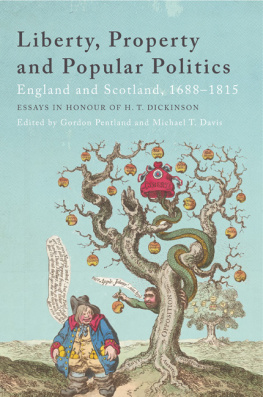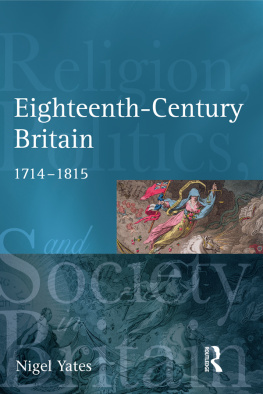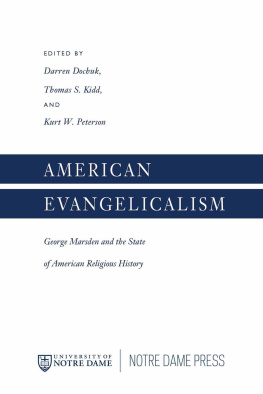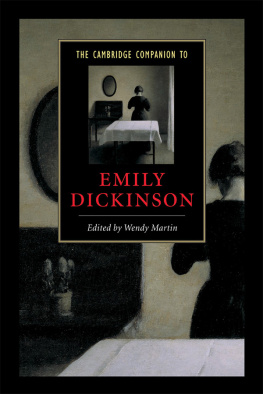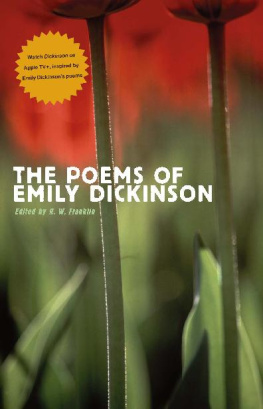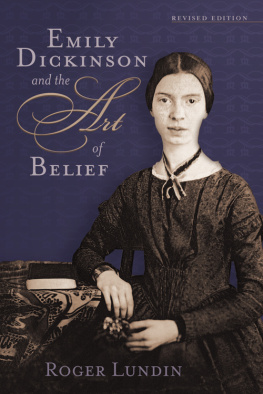
Liberty, Property and Popular Politics
England and Scotland, 16881815
Essays in Honour of H. T. Dickinson
Edited by Gordon Pentland and Michael T. Davis
EDINBURGH
University Press
editorial matter and organisation Gordon Pentland and Michael T. Davis, 2016
the chapters their several authors, 2016
Edinburgh University Press Ltd
The Tun Holyrood Road
12 (2f) Jacksons Entry
Edinburgh EH8 8PJ
www.euppublishing.com
Typeset in 11/13 Adobe Sabon by
IDSUK (DataConnection) Ltd, and
printed and bound in Great Britain by
CPI Group (UK) Ltd, Croydon CR0 4YY
A CIP record for this book is available from the British Library
ISBN 978 1 4744 0567 6 (hardback)
ISBN 978 1 4744 0568 3 (webready PDF)
ISBN 978 1 4744 0569 0 (epub)
The right of the contributors to be identified as authors of this work has been asserted in accordance with the Copyright, Designs and Patents Act 1988 and the Copyright and Related Rights Regulations 2003 (SI No. 2498).
The publishers would like to acknowledge the generous subventions towards the production of this book offered by the Enlightenment and Romanticism Research Network at Griffith University, Brisbane, and by the School of History, Classics and Archaeology at the University of Edinburgh.
Contents
Frances Dow
Gordon Pentland
Eckhart Hellmuth
Shin Matsuzono
Joanna Innes
Matthew P. Dziennik
Rmy Duthille
Martin Fitzpatrick
David Allan
Stephen M. Lee
Matthew Grenby
Emma Macleod
Atle L. Wold
Michael T. Davis
Marianne Czisnik
Gordon Pentland
Figures and Tables
Figures
English general acts concerning parishes and parochial clergy, 16891830
English local acts concerning church building, etc., 16891830
English general acts concerning non-Anglican sects, 16891830
Isaac Cruikshank, Mad Toms First Practical Essay on the Rights of Man (1792)
Isaac Cruikshank, Wha Wants Me (1792)
Isaac Cruikshank, The Friends of the People (1792)
The End of Pain (1793)
Number of letters per year, 17771805
Number of letters per month, 17931805
Tables
Authors cited in Pigs Meat
Sources for Harrington citations in Pigs Meat
Comparison of Pigs Meat, IIII (17935) with The Oceana and other works of Iames Harrington, with an account of his life by Iohn Toland (1771) and J. G. A. Pocock (ed.), The political works of James Harrington (1977)
Acknowledgements
First and foremost, we would like to thank Harry Dickinson, who has been supervisor, mentor, colleague, role model or friend (and often more than one of these) to the contributors to this volume. The idea for a festschrift had its origin some time ago and gained momentum following Gordon Pentlands visit to Griffith University in August 2013, which was sponsored by the Enlightenment and Romanticism Research Network. The subventions offered by the Enlightenment and Romanticism Research Network and by the School of History, Classics and Archaeology at the University of Edinburgh are gratefully acknowledged. Finally, we would like to offer our thanks to Ellie Bush, John Watson and their colleagues at Edinburgh University Press for their assistance in the preparation and production of this book.
Gordon Pentland and Michael T. Davis
H. T. Dickinson: An Appreciation
Frances Dow
Harry Dickinson came to Edinburgh in 1966 and has made it his home ever since. Appointed initially as an Assistant Lecturer in the Department of History at the University of Edinburgh, he became Lecturer in 1968 and Reader in 1973. In 1980 he took up the Richard Lodge Chair of British History and held it until his retirement in 2006, whereupon he became Emeritus Professor and Honorary Professorial Fellow. During his long and productive career he has published with enormous regularity: his c.v. lists items for every year since 1964 and includes six single-authored and over twenty edited volumes. He has been an effective and popular teacher at undergraduate and postgraduate levels; and he has made important contributions to the development of history in schools and universities in the UK and across the globe.
Harrys academic success is testimony, first and foremost, to his intellectual abilities and his dedicated professionalism; but it owes something, too, to the encouragement he received from key figures during his school and university years. Born in Gateshead on 9 March 1939, Harry was the only one of five surviving sisters and brothers to continue his education beyond the age of sixteen: no mean achievement for a son whose parents had both left school at twelve. Happily, a teacher at Gateshead Grammar School recognised his potential and encouraged him to apply to Kings College University of Durham, where he studied history from 1957 until 1960. He recalls being greatly impressed and influenced during his undergraduate years by the scholarly qualities he saw in J. R. Jones and Professor W. L. Burn. From Jones he learned sheer efficiency in organisation and presentation, qualities which have stayed with him throughout his career. From Burn he absorbed the importance of developing a deep appreciation of a period or topic, and his interest in the early eighteenth century was fired as a result of choosing a final year Special Subject on the reigns of William III and Anne, taught by Jones.
Joness influence did not end there. After graduation, financial constraints led Harry to take a Diploma in Education at Kings College and to become a schoolteacher. In retrospect the experience he gained then, and during his three years as history master at Washington Grammar School from 1961 to 1964, was to stand him in excellent stead as a university lecturer. But although he enjoyed teaching, he was conscious of an intellectual frustration and a desire for deeper study; this led to Jones, with whom he had kept in touch, recommending that he take an external MA, by thesis only. The thesis was to be on the War of the Spanish Succession in Spain itself, focusing on military and naval operations. In fifteen months, while studying part-time, Harry completed a 70,000 word dissertation which provided the basis for four peer-reviewed articles published in quick succession.
By the mid-1960s postgraduate opportunities and university posts were becoming more available. With support from Jones (who had moved to the University of East Anglia in 1963) and Burn, Harry embarked upon a PhD. Kings College Durham which had by then become the University of Newcastle upon Tyne awarded him the full-time Earl Grey Fellowship for 19646. Under the supervision of W. A. Speck, he began research on Henry St John and the Struggle for the Leadership of the Tory Party 17021714. The thesis was completed and the degree awarded in 1968, two years after his move to Edinburgh.
Harrys choice of PhD topic arose from his realisation, while exploring the War of the Spanish Succession, that the war had caused considerable debate and dissension within British domestic politics. He became particularly interested in the Tory criticisms of the war and chose to concentrate on Bolingbrokes role, rather than that of Harley as he had initially hoped, because he believed that Geoffrey Holmes, then the leading authority on the politics of Annes reign, intended to write a study of Harley. Harrys work was particularly influenced by Holmes, whom he greatly admired, as well as by Speck. Although appreciative also of Lewis Namiers great work, he thought that Namiers conclusions, adopted by Robert Walcott, did not apply to Annes reign, where party and ideological disputes were rampant.
Next page
